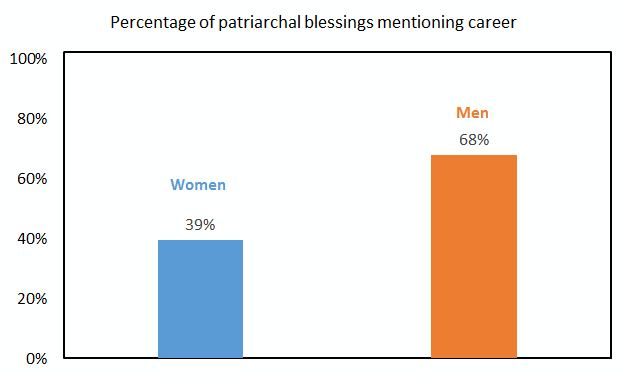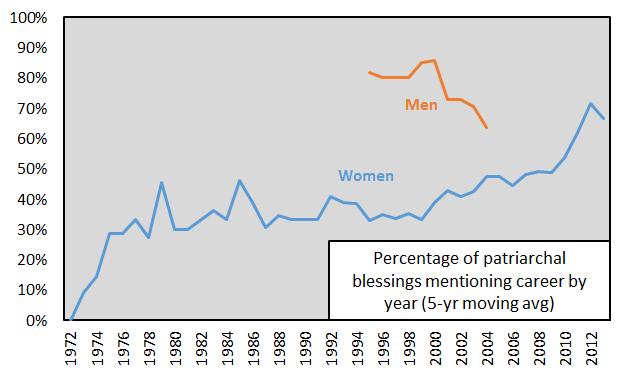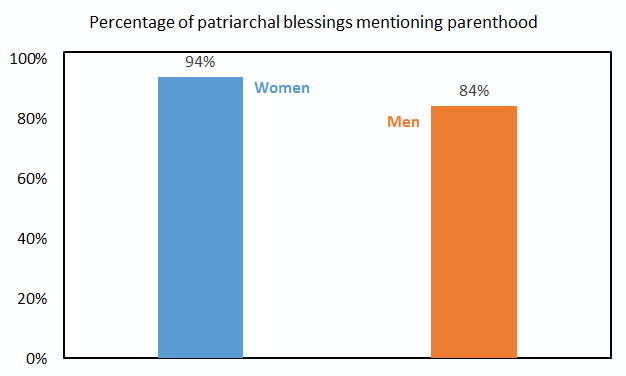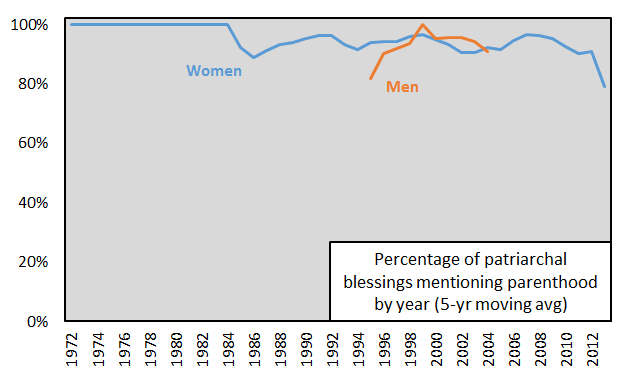Several months ago (in May, I think), there was a discussion at the Mormon Hub that turned to whether women’s patriarchal blessings mentioned a career or not. Heather (who blogs at Doves and Serpents) and I thought it would be interesting to see if we could get a little data on the question. Heather put together a brief survey, and we asked for responses in the Hub and in the fMh Facebook group. For purposes of comparison, we asked for men to respond too, although we got far more responses from women.
We got a total of 422 responses (actually slightly more, but a few were incomplete and couldn’t be included): 359 from women, and 63 from men. The years they reported receiving their patriarchal blessings ranged from 1941 to 2013.
This graph shows overall results, ignoring year of the blessing:
 Not surprisingly, patriarchs mentioned career far more often for men than they did for women.
Not surprisingly, patriarchs mentioned career far more often for men than they did for women.
This graph shows results across time. The lines are five-year moving averages. I didn’t want to show values based on really small amounts of data, so I’m showing only years where there were at least ten data points contributing to the moving average. This is why the graph doesn’t go all the way back to 1941, and why the line for men is really abbreviated. There were only enough data points from men to calculate a moving average for a few years.
 Here’s what I was expecting: I thought that perhaps with the release of the Proclamation on the Family in 1995, patriarchs would read the gender role prescriptions as a call for them to discourage women from having careers. But at least from these data, it looks like nothing at all like that happened. The rate for women stayed flat through the 90’s, and then actually increased from below 40% to above 60% since the turn of the millennium.
Here’s what I was expecting: I thought that perhaps with the release of the Proclamation on the Family in 1995, patriarchs would read the gender role prescriptions as a call for them to discourage women from having careers. But at least from these data, it looks like nothing at all like that happened. The rate for women stayed flat through the 90’s, and then actually increased from below 40% to above 60% since the turn of the millennium.
For comparison, we also asked whether people’s patriarchal blessings mentioned parenthood. This graph shows the overall result, ignoring year of the blessing:
 Again, not surprisingly, parenthood was mentioned more often for women than for men. The gap is smaller than for career, though.
Again, not surprisingly, parenthood was mentioned more often for women than for men. The gap is smaller than for career, though.
This graph shows results across time. Again, the lines are five-year moving averages, shown only for years where at least ten data points contributed to their calculation.
 What I think is interesting here is that I would have guessed that pretty much 100% of patriarchal blessings for women would mention parenthood. And for the older blessings, this was the case. But it’s kind of surprising to me that the percentage fell below 100 in the late 80’s, and has never gotten back there.
What I think is interesting here is that I would have guessed that pretty much 100% of patriarchal blessings for women would mention parenthood. And for the older blessings, this was the case. But it’s kind of surprising to me that the percentage fell below 100 in the late 80’s, and has never gotten back there.
Just to be explicit, I realize that there are gigantic limitations to these data. They don’t represent a random sample of Church members who received blessings in these years, so these results can’t be generalized to that population. Heck, I don’t even know if the responses represent actual Church members, or that people were making everything up. For all I know, the results represent nothing more than the work of some creative trolls. The definition of what constitutes a mention of career in a blessing was also not completely nailed down. It’s entirely possible, for example, that the change over time in women reporting their blessings mentioning career could be accounted for by women who received their blessings more recently expecting to hear about career more often, and so interpreting ambiguous statements as pointing toward career. Ideally, to solve this problem, I would get the full text of people’s blessings and then have raters who were blind to my hypotheses and to the year in which the blessings were given rate them for presence or absence of mention of career. But that’s not going to happen, and this is only a blog post, so I’m not crying too hard about it.
In any case, even given all the limitations, I think the results are intriguing just in that they were counter to my intuition. I’d love to see more serious work on the topic. I understand there’s at least one published collection of patriarchal blessings that has some from as recent as 1995, although I haven’t read it. The Church must have texts of of millions of blessings, considering that you can now go on lds.org and order a copy of your own or one given to a deceased ancestor. It seems unlikely that they would release any of them just to satisfy someone’s research interest, though.
Fascinating, Ziff. What a great analysis. One thought I had was that compared to other informal studies in which participants were recruited through places such as the fmh Facebook page, I would imagine that this data is more likely to be representative of the LDS population as a whole (at least the U.S. population). I suspect that that might be the case because LDS women who have feminist leanings as adults, may or may not have felt that way when they received their blessing and were unlikely to have expressed those inclinations to their stake patriarchs. Thus, collecting data about blessings from feminists groups seems less likely to be biased than other types of data.
As always, any good studies raises further questions. What I wonder is how many blessings mention marriage. I would imagine that it would be pretty close to 100% for both men and women. I think there is a strong cultural expectation that a patriarchal blessing will mention marriage (even to the point of causing some concern if it is not mentioned at all). Anecdotally, I think the mention of marriage when for people who don’t get married (or get married much later in life) is one of the main frustrations that people feel about their patriarchal blessings.
I’m a woman whose 1988 patriarchal blessing mentioned a career. During the small talk before the blessing, the patriarch asked what my career plans were. (Later I wondered, amused, if that was cheating.) At the time I wanted to be a lawyer, the patriarch’s own former profession. The subsequent blessing was studded with references to my law career, passing the bar, etc. I don’t know whether it was reverse psychology at work or a series of summer jobs at law firms, but eventually I decided against law and was left wondering what parts of the blessing were/weren’t valid anymore. Eventually I decided that since the career direction I’m considering now (a mid-life, post-SAHM reinvention) wasn’t anywhere on my radar back then, maybe the Lord (through the patriarch) used what was on my mind at that time to convey that it was OK for me to think about/pursue a career, The Big Benson Talk notwithstanding.
If, however, I was supposed to become a lawyer after all, I’m in some serious trouble. Uh-oh.
My Blessing doesn’t mention a career at all, and that is all I have done.
Beatrice, you are absolutely right. I have never married and wonder why it was even mentioned. It has been a source of great frustration (and pain).
My grandfather didn’t have his done until he was in his eighties. Before that time I remember asking him why he didn’t have a patriarchal blessing and he said “I don’t want to know where I messed up.”
I’m a more recent patriarchal blessing recipient, having received mine in October of 2010. My blessing talks both about having a family according to my desires and a career that I will be well-suited for and well-studied in. It’s been really empowering, because it puts my family up to my own discretion (for the record, I do want a family and I am married and pregnant now, but this calmed me a lot about the cultural expectation to) and encourages me in my non-familial pursuits. And then later it mentions the Proclamation on the Family–but I guess this means it’s compatible after all ;]
Fascinating insights, especially the trend towards patriarchal blessings becoming more explicit regarding women and employment. I will, however, point out the flaw in assuming that just because a patriarchal blessing doesn’t mention the words “work,” “employment,” or “career,” it does not mean a person is being discouraged from those pursuits. A patriarchal blessing does not dictate what life should be–only what we may achieve through our faith in the Lord, and our efforts as we apply counsel from the blessing into our lives.
My patriarchal blessing does not use the word “mission,” but many sections of my blessing became relevant and essential to my missionary service. Many women who are employed in the Church were never instructed to do so in their patriarchal blessings, yet their blessings provide guidance in counsel in making those decisions. These examples are relevant to the data being represented here, yet I can see no way in which the metrics presented could include them.
Because I didn’t take the survey, I can’t know how these results were measured. Maybe they did include data for women whose blessings were not specific regarding employment, but who felt guided to employment all the same. But to leave out such examples would greatly skew the data, and present a very different story if the survey was ever replicated, with the intent to include them.